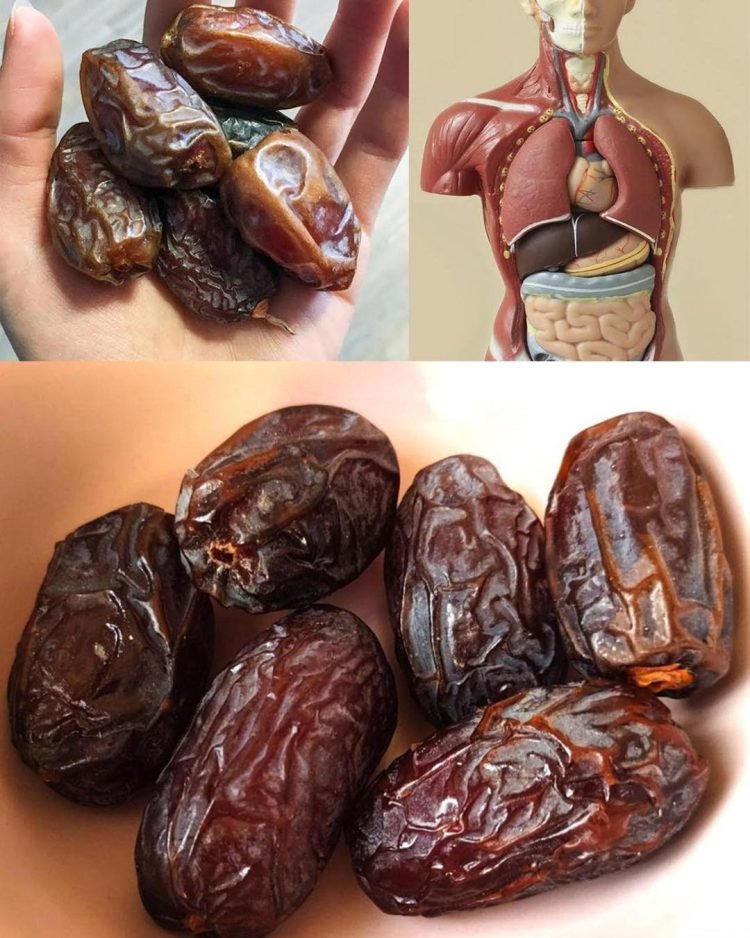Dates are truly a nutritional powerhouse, often deserving of the “superfood” title. Here’s a comprehensive look at their incredible benefits, how to use them, and important considerations.
What Are Dates?
Dates are the sweet, chewy fruit of the date palm tree. They have been a staple food in Middle Eastern and North African cultures for thousands of years. They come in several varieties (like Medjool, Deglet Noor, and Barhi), with Medjool being known as the “king of dates” for its large size, soft texture, and caramel-like flavor.
The Incredible Health Benefits of Dates
1. A Natural Energy Booster
Dates are packed with natural sugars—mainly glucose, fructose, and sucrose. Unlike the refined sugar in candy, the sugars in dates are released slowly into the bloodstream thanks to their high fiber content. This provides a steady, sustained energy boost without the dreaded “sugar crash,” making them a perfect pre-workout snack or a midday pick-me-up.
2. Powerhouse of Nutrients
Despite their small size, dates are dense with essential vitamins and minerals:
-
Potassium: Crucial for heart health, nerve function, and maintaining healthy blood pressure. Dates are even higher in potassium than bananas!
-
Magnesium: Essential for energy production, muscle and nerve function, and bone health.
-
Copper: Supports red blood cell formation and immune health.
-
Manganese: Important for brain function and bone development.
-
Vitamin B6: Aids in brain health and mood regulation.
-
Iron: A good plant-based source of iron, which helps prevent anemia.
3. Digestive Health Champion
Dates are one of the best fruits for digestive health.
-
High in Fiber: Just a 1/4 cup serving provides about 12% of the daily fiber requirement. This fiber adds bulk to stool, preventing and relieving constipation.
-
Prebiotic Effects: The fiber in dates acts as a prebiotic, feeding the beneficial bacteria in your gut (your microbiome), which is vital for overall digestive and immune health.
4. Natural Sweetener and Sugar Alternative
Dates are a whole-food alternative to refined sugar. You can use date paste, date syrup, or blended dates to sweeten smoothies, baked goods, and energy balls. This swap adds nutrients and fiber that white sugar lacks.
5. Supports Heart Health
Regular consumption of dates is linked to improved heart health.
-
The soluble fiber helps reduce LDL (“bad”) cholesterol.
-
Potassium helps manage blood pressure.
-
Antioxidants like flavonoids and carotenoids help reduce inflammation and prevent the oxidation of cholesterol, a key step in the formation of plaque in arteries.
6. Rich in Disease-Fighting Antioxidants
Dates contain more antioxidants than most other similar fruits, like figs and dried plums. Key antioxidants include:
-
Flavonoids: Powerful anti-inflammatories that may help reduce the risk of diabetes, Alzheimer’s, and certain cancers.
-
Carotenoids: Known to promote heart health and may reduce the risk of age-related eye disorders.
-
Phenolic Acid: Has anti-inflammatory properties.
7. Potential to Support a Healthy Pregnancy
In some traditional cultures, dates are recommended for pregnant women. Studies suggest that eating dates in the final weeks of pregnancy may:
-
Promote cervical dilation.
-
Reduce the need for induced labor.
(As always, pregnant women should consult their doctor before making significant dietary changes.)
8. Promotes Brain Health
The antioxidants in dates, particularly flavonoids, are known to help reduce inflammation in the brain. This has been linked to a lower risk of neurodegenerative diseases like Alzheimer’s and better cognitive function.
How to Incorporate Dates into Your Diet
Dates are incredibly versatile:
-
On Their Own: A simple, satisfying snack.
-
Stuffed: Fill them with almond butter, goat cheese, or a nut like a pecan or walnut.
-
In Smoothies: Adds natural sweetness and a creamy texture.
-
In Energy Balls: Blend with nuts, oats, and cocoa powder for a no-bake treat.
-
In Salads: Chop them up and add to grain or green salads for a sweet contrast.
-
In Baking: Use date syrup or date paste as a sugar substitute in recipes.
Important Considerations
-
Sugar Content: Dates are high in natural sugar and calories. Enjoy them in moderation, especially if you are watching your blood sugar or calorie intake. A typical serving is about 2-4 dates.
-
Sulfites: Some commercially dried dates contain added sulfites to preserve color. If you are sensitive, look for organic or unsulfured varieties.
-
Pesticides: Dates are often on the “Dirty Dozen” list for pesticide residue. Washing them thoroughly or choosing organic is a good practice.
The Final Verdict
Dates are far more than just a sweet treat. They are a nutrient-dense whole food that can boost your energy, support your digestion, protect your heart, and satisfy your sweet tooth in a healthy way. Adding a handful of these ancient fruits to your daily routine is a simple and delicious step toward better health.
